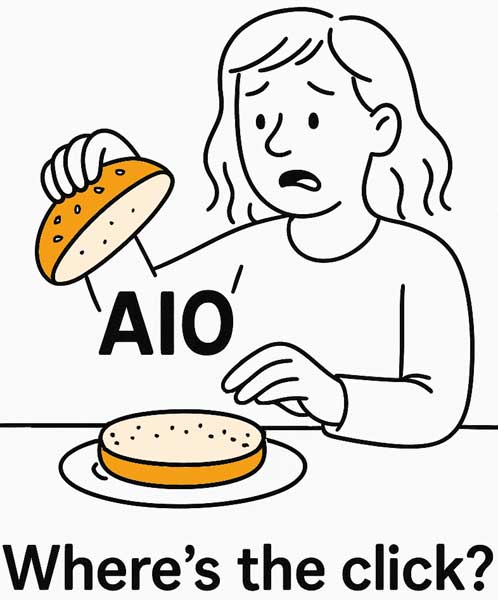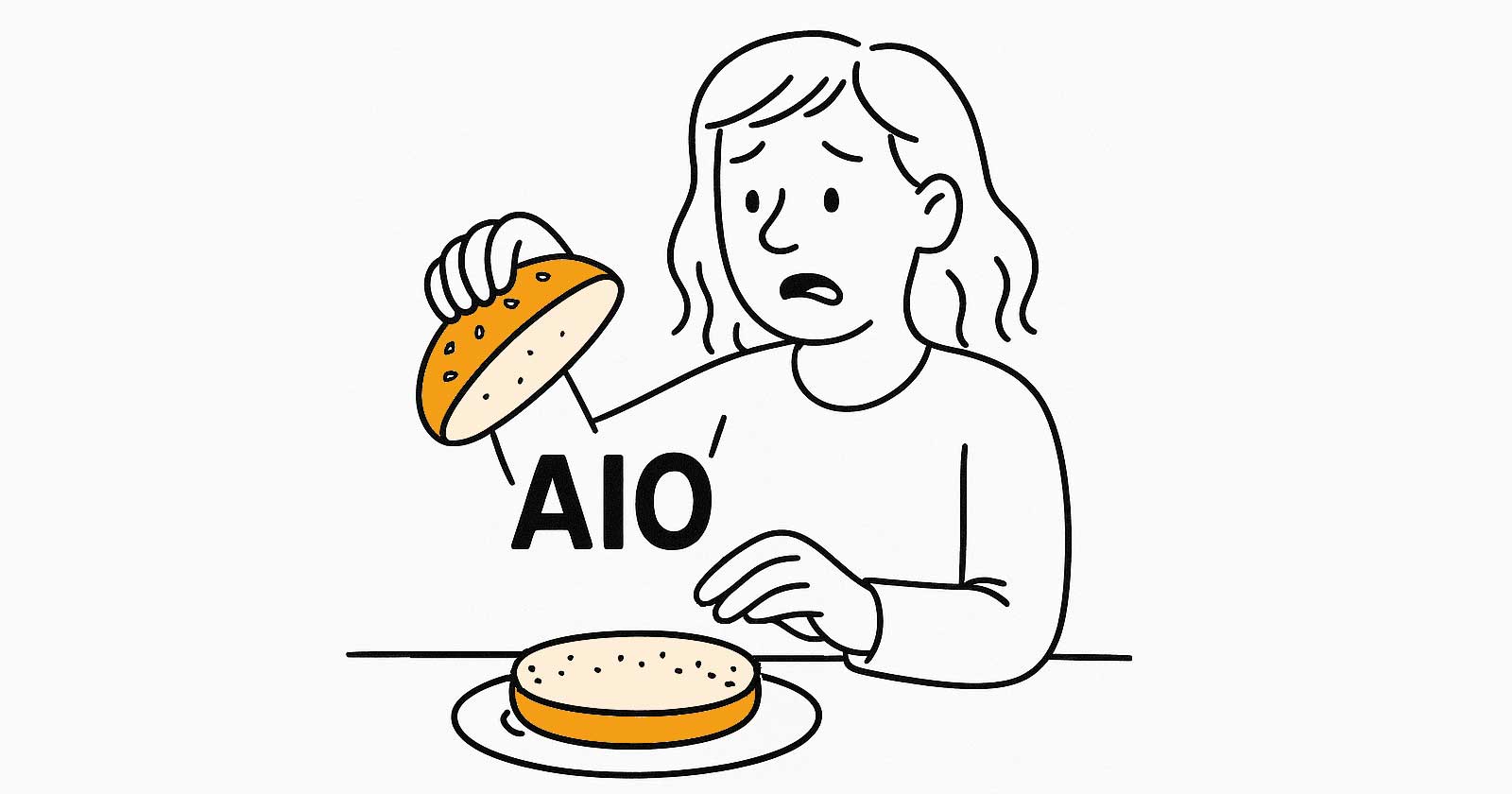Search marketer Michael Bonfils recently discussed how AI is disrupting search marketing and shared insights into what he feels is an appropriate response to one of the most difficult search environments he’s seen in his thirty years of experience.
Brutal Environment For Digital Marketing
Gianluca mentioned there’s a perception gap with AI where on one side are marketers who are heralding the end of SEO and PPC and on the other side are the “AI bros” who cheerlead that everything is going to become even better, with better leads from ChatGPT, etc.
He shook his head and said:
“It’s neither going to be a disaster and it’s neither going to be an AI paradise.”
Gianluca asked him what trends he’s seeing. Michael responded that the trends he’s seeing is that click volume has gone down since the introduction of AI. He said during other times when volume is down the click through rates go up, like during the pandemic. But that’s not happening now. Click through rates are down, volume is down but Cost Per Clicks are at historic highs.
Michael observed,
“But now, …the level we’re at now is the worst time since 2019 during the pandemic and prior to that it was never that bad.
…If you want throw the CPC factor in, the CPC’s are historically higher than they have been for years. So now we’ve got this perfect problem, click through rates down, volume down, CPC’s up. What does that mean? ROI is getting hit and clients are leaning on organic to try to make up for whatever shortfall there is and they can’t find it, they can’t find the traffic.
So to answer your question, …now that we’re going into Europe with AI overviews, are they impacting things? One hundred percent. And they’ll continue to change. “
Later on they discussed how a lot of what Google is doing is reactionary, a response to external pressures from companies like Perplexity AI and OpenAI, and the search industry is caught in the middle of it.
AI Overviews Leads To Loss Of Strategic Data

Michael explained:
“But the organic side, there is an area ….that is zero click. So zero click is for those audience members who don’t know what that means, zero click means when you are having a conversation with AI, for example, I’m trying to compare two different running shoes and I’m having this, “what’s going to be better for me?” …I’m having a conversation with AI and AI is pooling and referencing …whatever winning schema formats and content that are out there …and have this conversation with me, but it’s zero click. It’s not going to your site. It’s not going there. So without this data that really affects …organic content strategy.”
He then connects zero click to the loss of mid-funnel data which limits strategic insights. He said we have the purchase stage data but the middle part of that, where a person is researching the product on AI Overviews, that data is gone.
He continued:
“This is, you know, we have a funnel, we all know which is the awareness consideration phase and the whole center and then finally the purchase stage. The consideration stage is the critical side of our funnel. We’re not getting the data. How are we going to get the data?
So who who is going to provide that? Is Google going to eventually provide that? Do they? Would they provide that? How would they provide that?
But that’s very important information that I need because I need to know what that conversation is about. I need to know what two people are talking about that I’m talking about …because my entire content strategy in the center of my funnel depends on that greatly.”
Gianluca said that he discussed this lack of organic feedback that’s lost in the AI Overviews black hole and if Google was considering some way to provide that data to publishers and related that Mueller said that it’s all still changing.
Visibility May Emerge As An Important Metric
Bonfils and Gianluca discussed that it’s possible that, in the absence of click data in a zero-click search environment, visibility (impressions) will emerge as the important data point for marketers to track organic performance.
“I think that maybe visibility, which was was a metric that was somehow used as generically maybe is going to be our main metric in the sense OK, we can set up representative queries that can represent the more than one query so.
And say OK for this query or set of queries we have these average visibility and comparing especially against our direct competitor maybe this is going to be because maybe we cannot even attribute anything in terms of traffic, if not just the direct traffic that is by the click but maybe?”
Strategy Shifts Conversational Engagement
Michael observed:
“Our model, our SEO business model, has been based on keywords data, around keywords, and strategy around keywords. Now keywords are gone.
So what is replacing keywords and how are we going to do this from this point forward, especially on a global level?”
He said:
“So let’s take the whole question, and as many questions as possible, that come up to whatever your product is, that whole FAQ and the answers, the question, and the answers become the keyword that we all optimize on moving forward.
Because that’s going to be part of the conversation.”
Takeaways
AI Overviews Disrupt Traditional Marketing Metrics
- Click-through rates and search volume are both down, while cost-per-click is at historic highs.
- ROI is shrinking, and brands are unsuccessfully trying to make up the gap through organic traffic.
Keyword Data Loss From Zero-Click Behavior
- AI Overviews remove visibility into the mid-funnel stage (user research and comparison).
- This makes it difficult to optimize content strategy since marketers can’t access the conversations users are having with AI.
Visibility Replacing Clicks as a Key Metric
- In the absence of traffic data, visibility (impressions) may become the new benchmark for SEO success.
- This shift requires marketers to focus on query coverage and presence rather than just traffic attribution.
Outdated Keyword-Centric SEO Model
- Traditional keyword strategies don’t align with how users interact with AI, which is based on natural language questions and follow-ups.
- Optimizing for topical coverage and FAQ-style formats may better match how AI surfaces content.
Google’s AIO is rapidly changing digital marketing. Foundational touchstones of SEO like clicks are disappearing, mid-funnel user behavior is hidden. The question and answer format of AI Search and LLMs make traditional keyword-based SEO ineffective, if not obsolete. Bonfils suggests that marketers must adapt by shifting toward conversational, FAQ-style content and consider tracking visibility instead of clicks that no longer exist in order to stay competitive.
Watch the interview:
Featured image AI generated and edited by author

